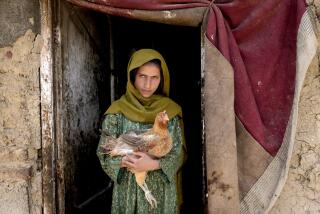Shortchanging Afghanistan
- Share via
As the world debates whether to topple Iraq’s Saddam Hussein and, at the environmental summit in Johannesburg, how to lift the poorest nations, it should not forget the immense risks and needs in Afghanistan. The United States is living up to its promise of aiding the Kabul government, but too many nations are not.
Years of drought and war destroyed great stretches of agricultural land in a country that once produced abundant fruits and grains. The one crop that has come back in near- record proportions this year is the opium poppy, a harvest that enriches criminals and gives local warlords even more reason to resist the interim Kabul government of President Hamid Karzai. More money isn’t the only key to establishing a more normal economy and a stable government, but without it there’s not much hope.
The United Nations expected about 400,000 Afghans to return to their homeland this year once the Taliban was ousted and Al Qaeda’s grip was broken. More than three times that number rushed back. Refugees once received 550 pounds of wheat upon return; that was cut to 220 pounds. World Food Program officials now worry they may have to trim the allotment to 110 pounds per family. The U.N. food officials say they requested $285 million this year and are short about $70 million promised by nations at a Tokyo conference last winter but not yet paid.
The shortfall in humanitarian aid from European and Middle Eastern nations is twinned with a lack of infrastructure. Schools and hospitals remain unbuilt and wells undug. The most basic need of life, clean water, is available only to about 20% of the Afghan people.
The refusal of the U.N. Security Council to dispatch peacekeepers outside the capital has made aid organizations wary of doing needed work in the countryside. But constructing roads and schools in rural areas would provide work for people now dependent on warlords and opium for money.
U.N. Secretary-General Kofi Annan and a number of U.S. senators have recommended expanding the peacekeeping force; Washington should take the lead in urging allies to provide troops and money for that purpose. After the Soviets withdrew in 1989 following a decade of war, fighting among Afghan warlords caused more havoc. It is likely to take more than a year to get an Afghan army functioning. During that time, warlords will further entrench themselves, increasing the risk of renewed civil war once troops leave. The last Afghan civil war set the stage for the Taliban to impose its own form of order.
The fragile Karzai government would gain strength from demonstrating that it can win money to feed and house refugees and create jobs. Washington has paid its promised share and others should pay up. It’s that or another devil-breeding round of chaos across Afghanistan.
More to Read
Sign up for Essential California
The most important California stories and recommendations in your inbox every morning.
You may occasionally receive promotional content from the Los Angeles Times.










